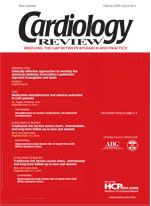Impaired fasting blood glucose and increased morbidity after coronary artery bypass graft surgery
This month’s issue of Cardiology Review features a combined article in the diabetes and coronary artery disease sections that evaluates the relationship between preoperative levels of fasting blood glucose that are “impaired” but are not diagnostic of diabetes mellitus on the one hand and increased morbidity after coronary artery bypass graft surgery on the other. Dr. R.E. Anderson and his colleagues from Sweden studied 1,895 surgical patients and found that fasting blood glucose levels either slightly above or below the diagnostic threshold for diabetics carried an increased risk of cardiac mortality, a risk that was similar to that of patients known to have diabetes. Dr. Harold L. Lazar comments on these findings for Cardiology Review.
Our feature article in the lipid disorders and coronary artery disease sections concerns the use of HMG-CoA reductase inhibitors (statins) before percutaneous coronary intervention in order to prevent periprocedural myocardial infarction. The authors, Dr. Carlo Briguori and associates from Italy, studied 451 patients (226 in the statin group and 225 in the control group). They found a positive effect of preinterventional statins on cardiac enzyme elevations and attributed this effect to non—lipid-related mechanisms. Dr. Stanley J. Katz addresses the clinical implications of the article in his commentary.
In a combined article in the stroke and arrhythmias sections, Drs. Margaret C. Fang and Daniel E. Singer discuss the interrelationship between age, anticoagulation intensity, and risk for intracranial hemorrhage in patients with atrial fibrillation who are also anticoagulated with warfarin. The authors identified 170 patients who developed intracranial hemorrhage and compared them to 1,020 control patients from their anticoagulation clinic. Surprisingly, as Dr. Joseph T. Dell’Orfano notes in his commentary, a reduced international normalized ratio did not lower the risk of intracranial hemorrhage, although it did reduce the risk of ischemic stroke.
In the hypertension section, Drs. Jose A. Silva and Christopher J. White investigated brain natriuretic peptide levels in patients with hypertension to see whether renal artery stenosis could increase these levels. What this means for blood pressure reduction after renal stent revascularization is discussed by Drs. Alan H. Gradman and Yoel R. Vivas in their commentary.
ln our continuing Drugs in Trial series, Dr. Stephen P. Glasser discusses the role of high-density lipoprotein cholesterol as a risk factor for cardiovascular disease and comments on current therapy, as well as some exciting new approaches to managing this aspect of atherogenesis.
